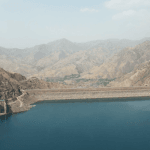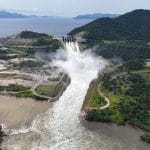REVITHOUSSA, Greece – Greece inaugurated on November 22 the upgraded liquefied natural gas terminal (LNG) in Revithoussa, operated by gas grid operator DESFA, in the Greek region of Attica, west of Athens.
Following a packed ceremony in a makeshift tent on the artificial Revithoussa Island in the Gulf of Megara accessible by small boats from the nearby shore, Greece’s Energy Minister Giorgos Stathakis told New Europe that the project will boost Greek and European energy security.
“Today’s project is of strategic importance because it is essential the largest entrance gate of LNG in the Balkans and with the Balkan interconnections it’s transformed into a essential entry point with an export capacity of approximately two-thirds of the natural gas that will be supplied to this terminal,” Stathakis said. “Therefore for us it’s the most important project that advances the diversification of natural gas sources,” he added.
The expanded Revithoussa LNG terminal in conjunction with the Trans Adriatic Pipeline (TAP) and the Interconnector Greece Bulgaria (IGB) as well as a planned pipeline between Bulgaria and Romania will open new routes for natural gas supply in Europe, diversifying energy supplies in the Balkan region, which heavily relies on Russia for gas supplies.
“Clearly the interconnections between the Balkan countries and the strengthening of projects create a better environment for diversification. Nobody is talking about the complete replacement of today’s gas sources that originate from Russia. But they create a more balanced environment in natural gas that allows for part of the market to come from other sources,” Stathakis said.
This terminal, already in operation, provides Greece with more affordable, secure and sustainable energy. The project was built in two stages: first the construction of a Combined Heat and Power plant and then the extension of the storage capacity of the Revithoussa terminal. The second stage included the construction of a third tank, the upgrade of marine facilities and the installation of additional technology equipment to increase the gasification.
The European Commission welcomed the completion of the third storage tank in Revithoussa, reminding that €40 million from Cohesion Policy funds helped this important energy project get off the ground. “Thanks to this Cohesion Policy project, citizens are saving money in energy bills and Greece confirms its position as an entrance gate for natural gas supply within a secure and interconnected European energy market,” European Regional Policy Commissioner Corina Creţu said in a statement from Brussels.
Meanwhile, Bulgaria’s Deputy Energy Minister Zhecho Stankov told New Europe on the sidelines of the RE-Source 2018 conference in Amsterdam on November 21 that the IGB is a very important project. “The diversification of the gas supplies is one of the most important points in our government strategy,” he said.
“At the moment the project is developing good. We’re expecting in 2020, at the end of the year, to have the interconnector in operation. This will give us the real diversification because that’s the first quantity of gas coming from another route and another source. At the moment, we’re depending 95 percent from one supplier and one route. That’s the (Russian) Gazprom contract coming from north to south delivering gas,” Stankov said, reminding that Bulgaria was one of the “big losers during the natural gas crisis of 2009 and, of course, that’s why we’re working very hard constructing new interconnectors.”
The Bulgarian state-owned gas company and the Azeri state gas supply company have already signed contract for 1 billion cubic meters (bcm) from Azerbaijan’s Shah Deniz-2 field starting from 2020, Stankov said, adding: “Of course, it’s very important to mention how much is 1 bcm for Bulgarian natural gas system. It’s about one third of our energy consumption.”
follow on twitter @energyinsider







